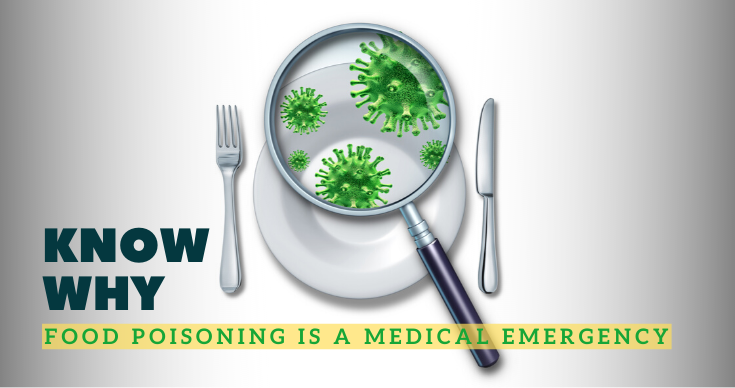What Is Food Poisoning? Is Food Poisoning A Medical Emergency?
Food nourishes our body but sometimes it can even become poisonous due to the presence of dangerous bacteria, parasites and viruses like Salmonella, E.Coli, Listeria, Trichinella, Toxoplasma, and Norovirus. Food poisoning is a common gastrointestinal condition caused by the consumption of infected or contaminated food. If left ignored, it can even become a medical emergency.
Today, ILS Hospitals would like to discuss food poisoning in brief. So, read this blog to understand more about this unpleasant medical condition.
Symptoms
There are always tell-tale symptoms of any medical condition. The symptoms of food poisoning are mentioned below:
-
Nausea and vomiting
-
Diarrhoea
-
Poor appetite
-
Abdominal cramps
-
Fever and chills.
Immediately rush to the hospital’s ER if the above symptoms persist for more than three days and when you notice severe symptoms as shown below:
-
Dehydrated body (dry mouth and no urine)
-
Blood in vomit, stool or urine
-
Dizziness and weakness
-
High fever
-
Hazy vision
-
Muscle cramps
-
Severe weakness.
Causes
Apart from certain bacteria, parasites and viruses, are there any other causes for food poisoning? Yes, the following can also cause food poisoning.
-
Eating raw or undercooked eggs, fish, chicken and other meats
-
Eating uncleaned or not properly washed fruits
-
Consuming raw and imperfectly cooked vegetables and leafy greens like cabbage, spinach, tomatoes, cauliflower, mustard greens etc.
-
Preparing food without maintaining any hygiene
-
Drinking unpasteurized milk and consuming its products
-
Having improperly stored food.
Diagnosis
The doctor will diagnose your food poisoning through physical exams and by keeping note of your medical history and present condition. In the case of food poisoning, you’ll be prescribed these primary diagnostic tests by the medical practitioner:
– Samples of the eaten food
– Blood test
– Stool test.
Treatment
Mostly, food poisoning cases solve on their own by doing the following things:
-
Sipping plenty of fluids and oral rehydration solution (ORS)
-
Eating a bland and nutritious diet
-
Avoiding spicy, fatty and oily foods
-
Eating lighter meals
-
Consuming vegetable soups and fruit juices
-
Avoiding dairy and dairy products
-
Taking plenty of rest
-
Having medicines prescribed by the medical professional.
If the condition still doesn’t get better, then it might indicate a serious medical condition. Food poisoning is surely a medical emergency if it lasts for many days and the symptoms get worse. So, always eat fresh, clean and properly cooked food. Also, ensure that the food is prepared by freshly washed hands. Come to ILS Hospitals in Kolkata or Agartala for any medical help.
When To Seek Medical Treatment For Food Poisoning
Are you feeling severe stomach cramps with nausea and vomiting? Are you rushing to the washroom every 2 minutes? Did you have something for dinner or even lunch or breakfast which could be contaminated? Could be, that you are suffering from food poisoning. It might sound funny to many individuals, but severe food poisoning is also considered as a medical emergency. The word ‘medical emergency’ casts impressions of – elderly man being carried in an ambulance due to heart attack or a punk youth taken to the ER due to road accidents, but it is a much broader scope.
Read more – Symptoms of Cardiac Emergency
It is true that you can treat minor to mild food poisoning with home remedies, adequate rest and over the counter drugs, but you need immediate medical attention to address if it is severe.
Food poisoning is a foodborne condition which occurs when you consume contaminated food or water. The severity and symptoms vary depending upon your immunity, strength and the pathogen you got infected with. Usually, it starts within a few hours after you eat the contaminated food, but it can also take a few days to weeks in some cases. The symptoms you will usually feel are nausea, vomiting, fever, fatigue, dehydration, dry mouth, lose motion etc.
However, in case you have symptoms such as feeling disoriented, dizziness, low blood pressure, high fever with chills, palpitations, breathing trouble, severe vomiting/diarrhoea, hazy vision, blood in vomit or stool, loss of urination, dark-coloured urine along with severe cramps, then you are going through severe food poisoning. If it is not addressed timely, it may cause a life-threatening crisis such as severe dehydration or even an organ damage.
After your preliminary check-up, your doctor will determine the exact treatment approach. Ideally, you will have to receive IV fluids and electrolytes along with antibiotics to boost your body functions. Moreover, the doctors will keep a close eye on the condition of the body temperature, blood pressure, kidney and nerve functions.
Needless to say, a timely cure will ensure proper recovery with no long-term complications. So, if you or any of your loved one is showing symptoms of the same, get in touch with our ER team and ensure your health and recovery.
The cases of food poisoning are quite common during the monsoon. You are hereby, recommended to avoid untreated water, unwashed food, raw or poorly cooked food, pre-cut fruits/vegetables, roadside food etc, particularly during monsoon.












